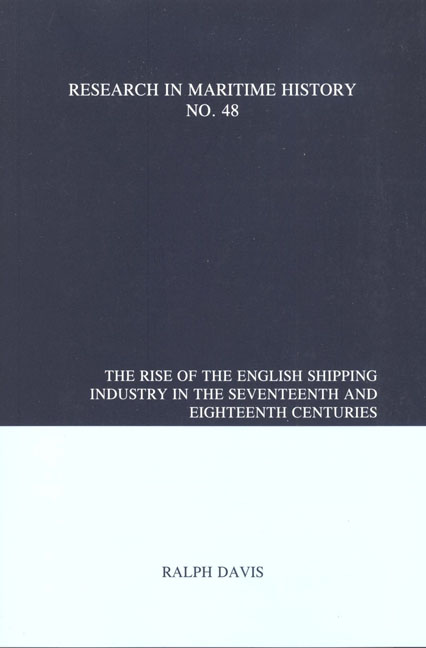Book contents
- Frontmatter
- Contents
- Introduction to the 2012 Edition
- Series Editor's Note
- Introduction
- Preface
- Chapter 1 The Widening of Horizons, 1560-1689
- Chapter 2 Consolidation, 1689-1775
- Chapter 3 Ships and Shipbuilders in the Seventeenth Century
- Chapter 4 Ships and Shipbuilders in the Eighteenth Century
- Chapter 5 The Shipowners
- Chapter 6 The Merchant Seamen
- Chapter 7 The Pay and Conditions of Merchant Seamen
- Chapter 8 Shipping Management and the Role of the Master
- Chapter 9 Shipping and Trade
- Chapter 10 The Nearby and Northern European Trades
- Chapter 11 The Southern European and Mediterranean Trades
- Chapter 12 The East Indian Trade
- Chapter 13 The American and West Indian Trades
- Chapter 14 The Government and the Shipping Industry
- Chapter 15 War and the Shipping Industry
- Chapter 16 Four Ships and Their Fortunes
- Chapter 17 Was It a Profitable Business?
- Chapter 18 Conclusion
- Appendix A A Note on the Shipping Statistics, 1686-1788
- Appendix B Sources for the History of the Shipping Industry
- Index
Chapter 1 - The Widening of Horizons, 1560-1689
- Frontmatter
- Contents
- Introduction to the 2012 Edition
- Series Editor's Note
- Introduction
- Preface
- Chapter 1 The Widening of Horizons, 1560-1689
- Chapter 2 Consolidation, 1689-1775
- Chapter 3 Ships and Shipbuilders in the Seventeenth Century
- Chapter 4 Ships and Shipbuilders in the Eighteenth Century
- Chapter 5 The Shipowners
- Chapter 6 The Merchant Seamen
- Chapter 7 The Pay and Conditions of Merchant Seamen
- Chapter 8 Shipping Management and the Role of the Master
- Chapter 9 Shipping and Trade
- Chapter 10 The Nearby and Northern European Trades
- Chapter 11 The Southern European and Mediterranean Trades
- Chapter 12 The East Indian Trade
- Chapter 13 The American and West Indian Trades
- Chapter 14 The Government and the Shipping Industry
- Chapter 15 War and the Shipping Industry
- Chapter 16 Four Ships and Their Fortunes
- Chapter 17 Was It a Profitable Business?
- Chapter 18 Conclusion
- Appendix A A Note on the Shipping Statistics, 1686-1788
- Appendix B Sources for the History of the Shipping Industry
- Index
Summary
Popular interest in the maritime exploits of the first Elizabethans never fades. The story of the defeat of the Spanish Armada is gratifying not only to English patriotism but to all who welcome the humbling of the arrogant, defiance of the oppressor, the defeat of the great menace by the small, brave victim. The story is a true one, but as its by-product it has produced a myth; the myth of a nation of seafaring Englishmen confronting a Spain of landlubbers, a Spanish fleet manned by soldiers and the conscripted occupants of the country's jails. The truth is that Spain in 1588 controlled a merchant fleet which, if it was rivalled at all in Europe, was rivalled only by the Dutch; a fleet manned from the coasts of Biscay and León and from the newly-acquired Kingdom of Portugal, which had been for centuries the homes of a hardy race of seamen. The English by contrast, so far from being at that time the heirs to generations of seagoers, were newcomers to ocean trade and shipping.
In 1560, when an anxious government first investigated in detail the resources available for the defence of Elizabeth I's realm, the English owned, perhaps, some 50,000 tons of merchant shipping of every kind; in 1572 the total had hardly grown, and it included only fourteen ships of two hundred tons or more. At this time the Dutch were creating the greatest of European shipping industries; in the year 1562 the Dutch ships entering the Baltic to fetch timber and corn and hemp numbered 1192, the English fifty-one. Dutch seamen coasted all along the edges of Europe from the Skaw to the Straits of Gibraltar, and to Norway and England, with southern wine and salt, Baltic goods and herring of their own catching. In the Mediterranean the tartanes of Marseilles, the argosies of Venice, Ragusa and Genoa, the galleys of Barcelona, Seville and Cádiz carried to and fro not merely precious cargoes but also vast tonnages of corn, salt and flax. The Spaniards and Portuguese had their fleets of great ships for the passage of the Atlantic and the Indian oceans to far-distant possessions. In 1560, England ranked low among the maritime states; though her navy was a real force, her merchant fleet was by European standards an insignificant one.
- Type
- Chapter
- Information
- Publisher: Liverpool University PressPrint publication year: 2012



